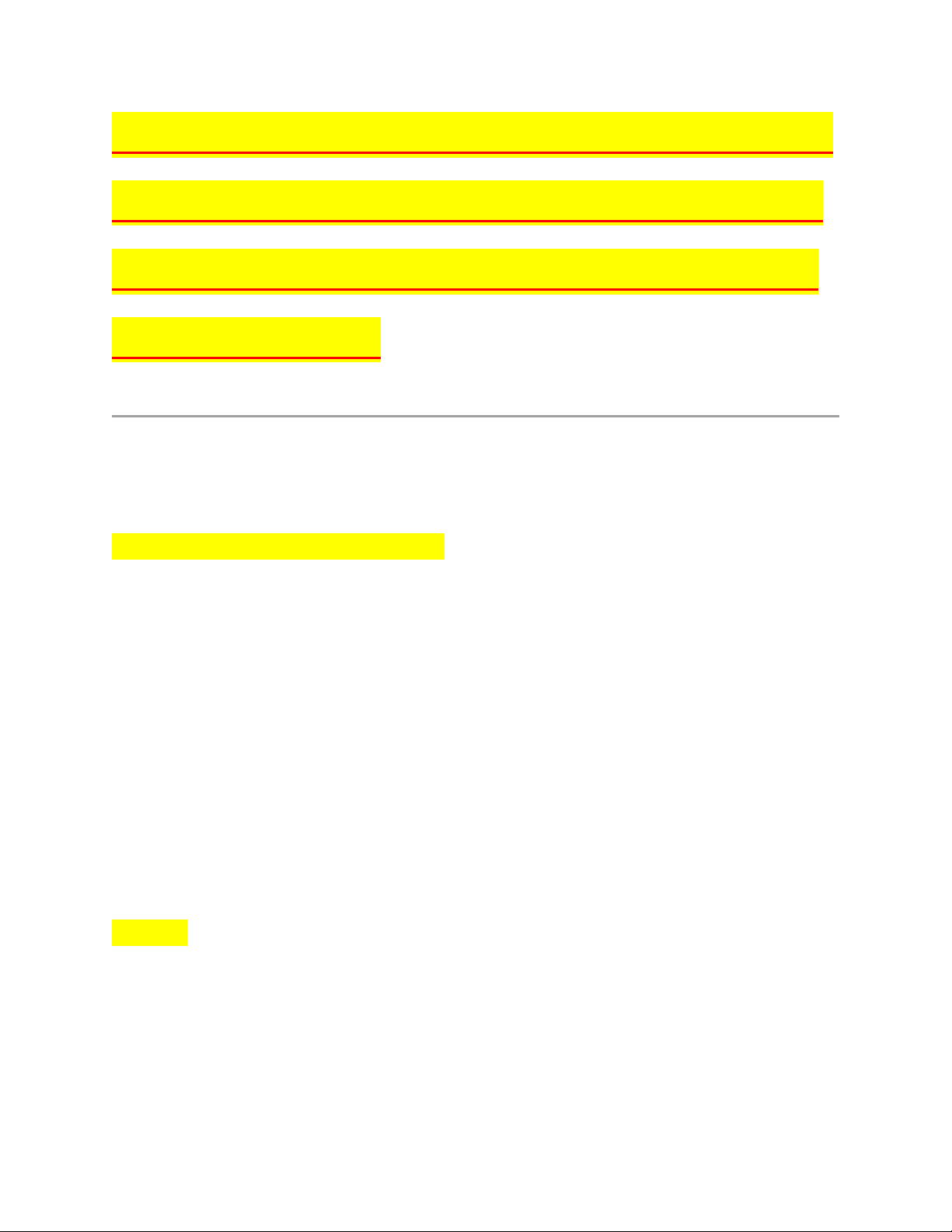
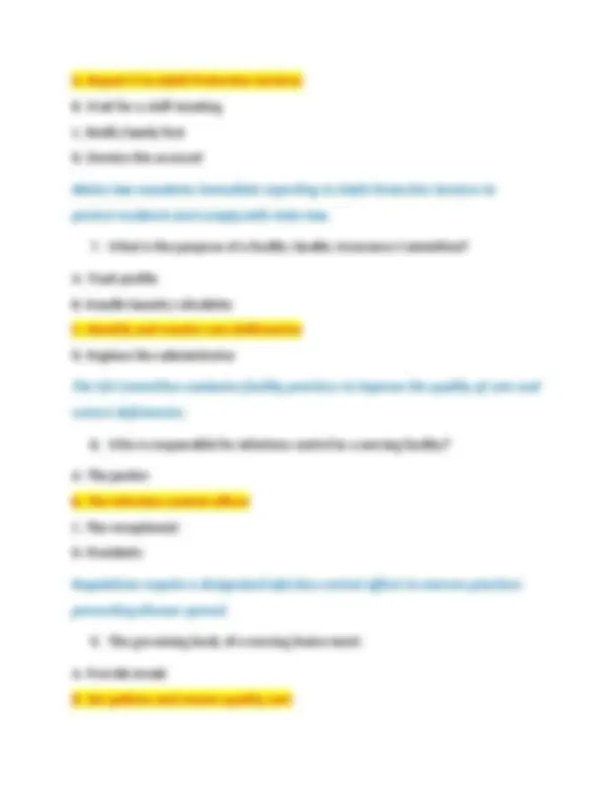
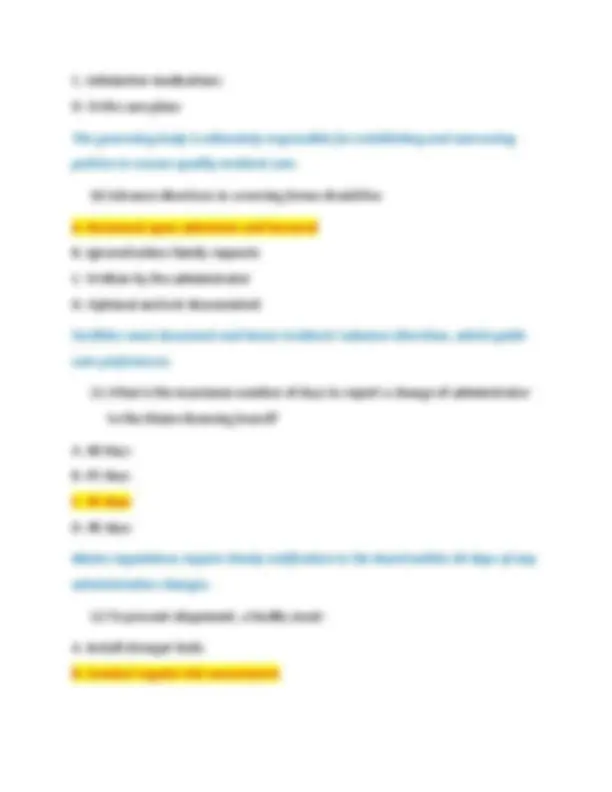
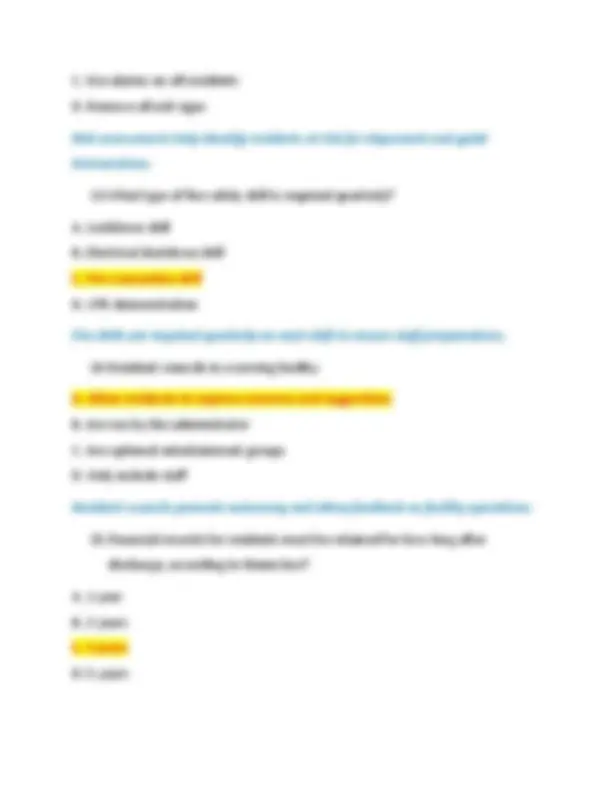
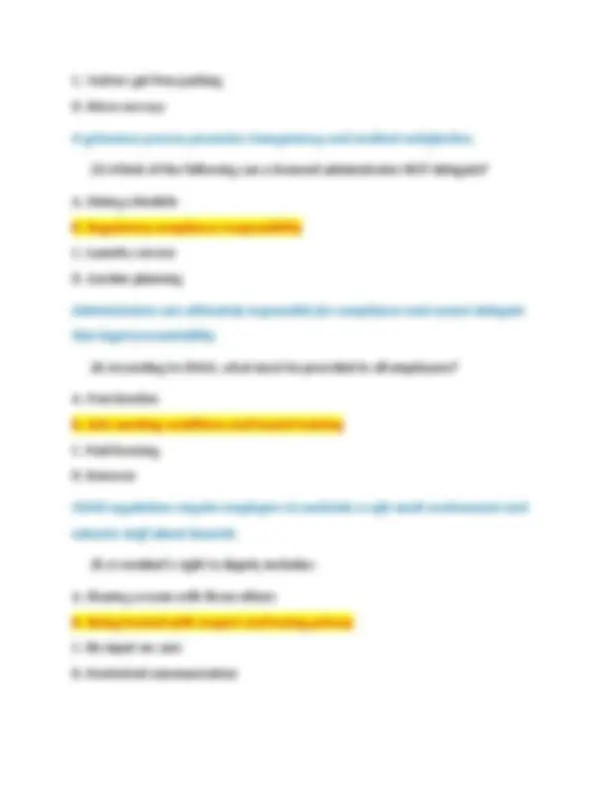
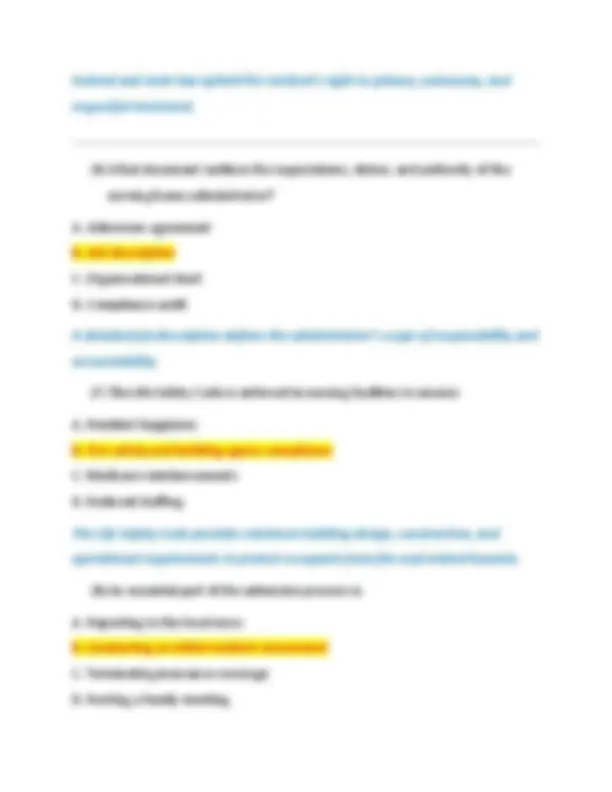
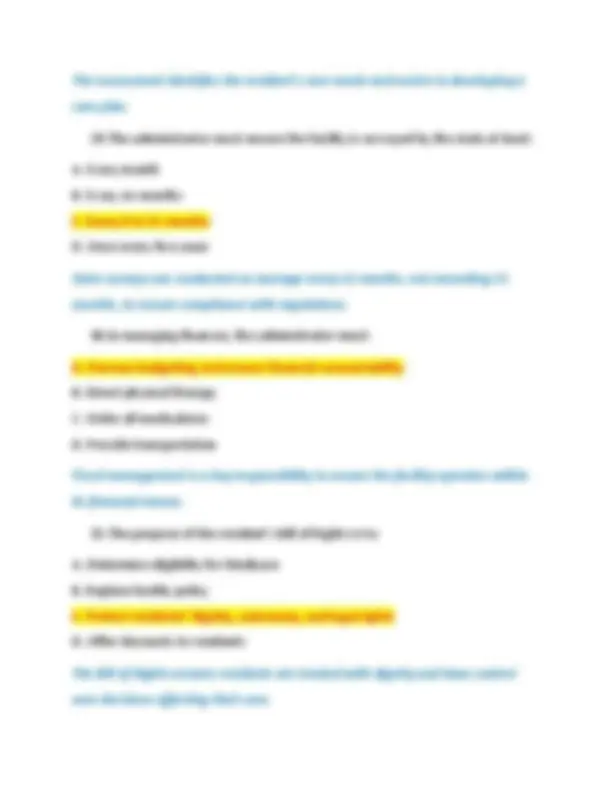
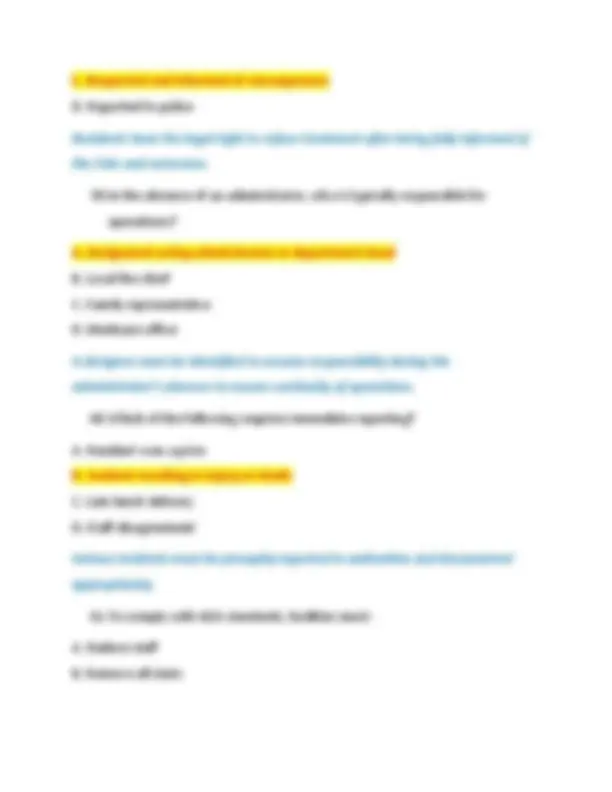
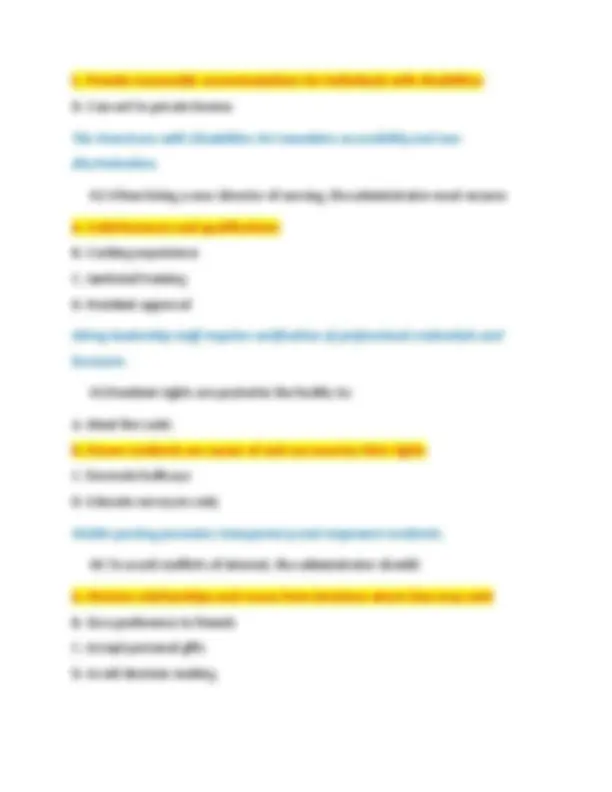
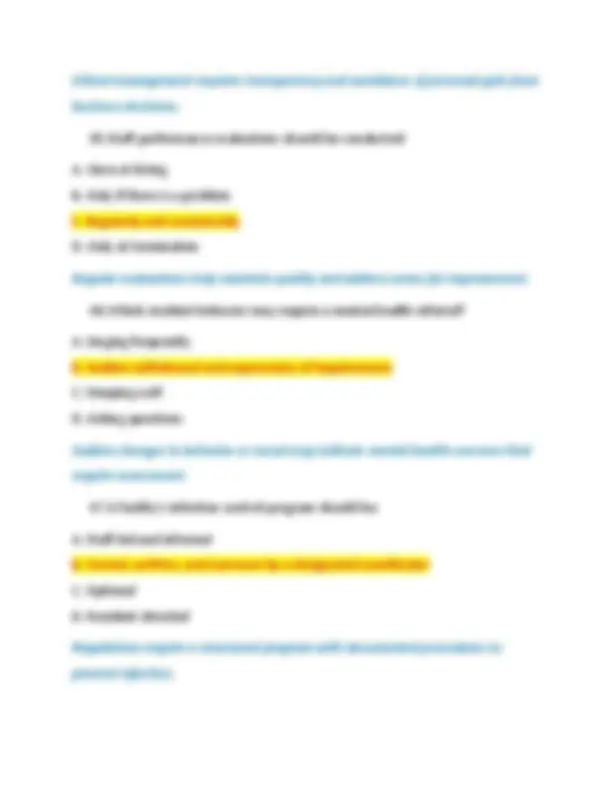
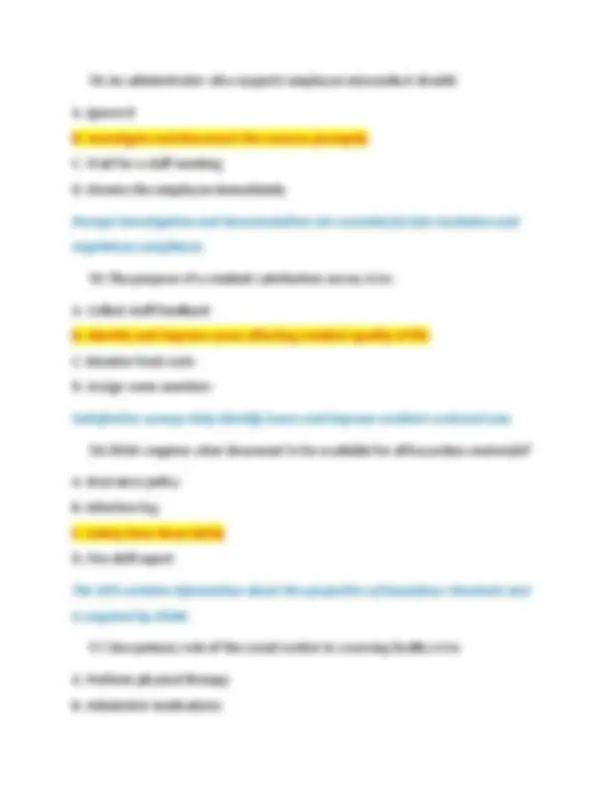
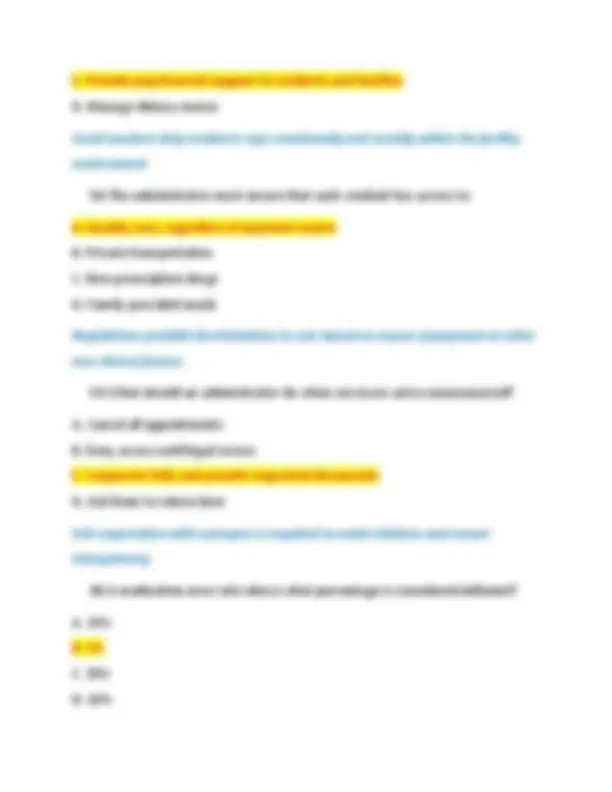
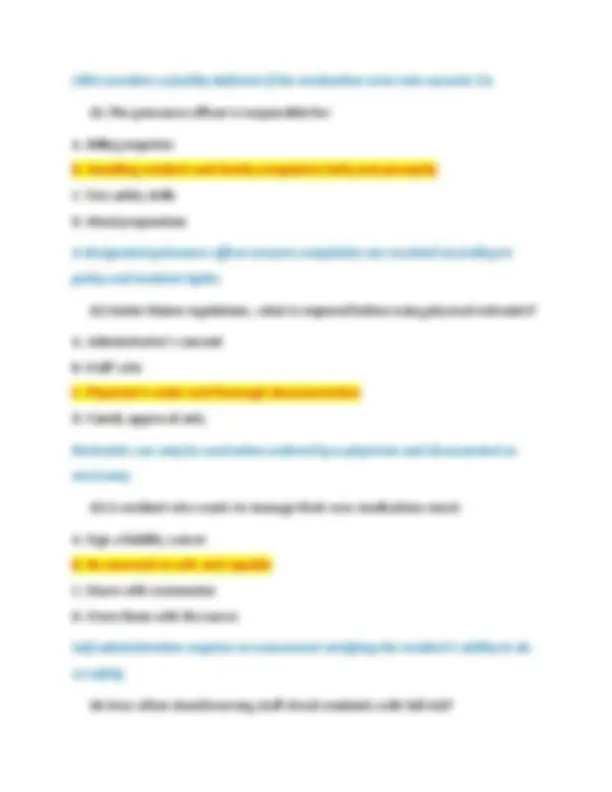
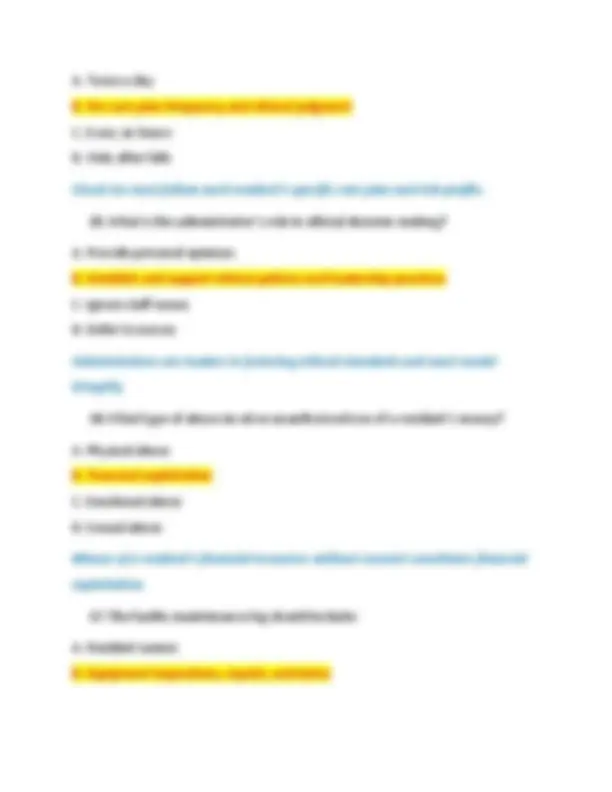
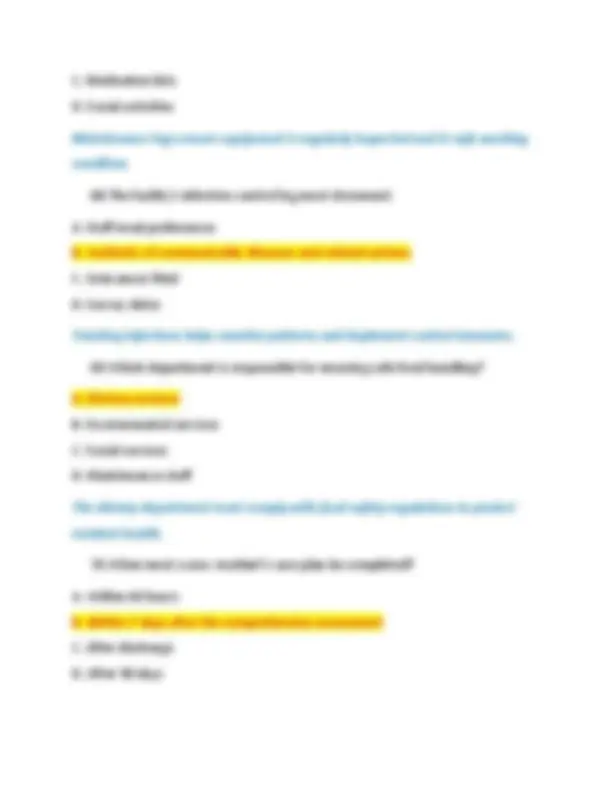
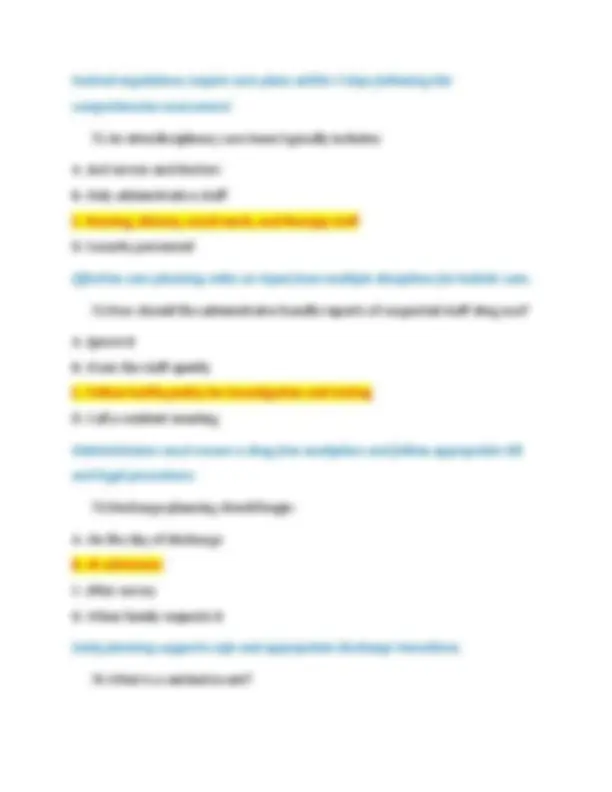
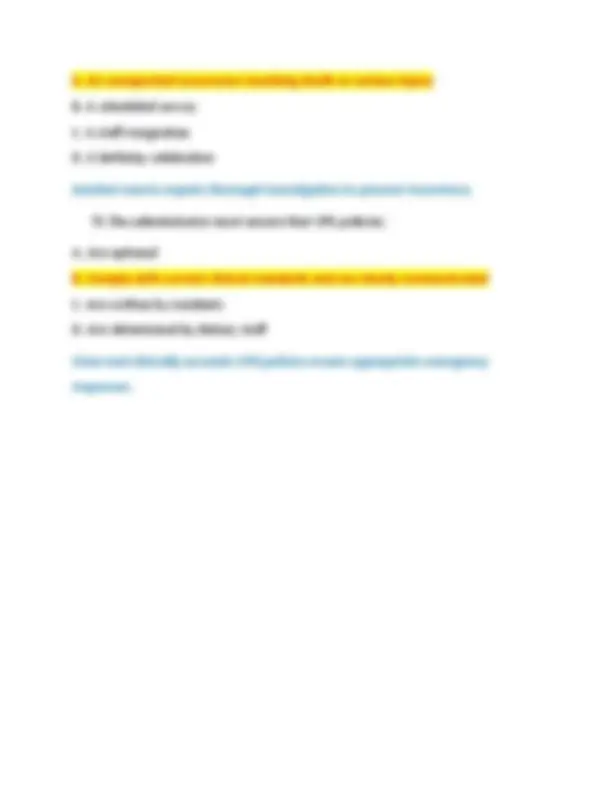


Study with the several resources on Docsity

Earn points by helping other students or get them with a premium plan


Prepare for your exams
Study with the several resources on Docsity

Earn points to download
Earn points by helping other students or get them with a premium plan
Community
Ask the community for help and clear up your study doubts
Discover the best universities in your country according to Docsity users
Free resources
Download our free guides on studying techniques, anxiety management strategies, and thesis advice from Docsity tutors
Maine – Board of Nursing Home Administrators licensing exam Questions And Correct Answers (Verified Answers) Plus Rationales 2025 Q&A | Instant Download
Typology: Exams
1 / 24

This page cannot be seen from the preview
Don't miss anything!

















C. Administer medications D. Write care plans The governing body is ultimately responsible for establishing and overseeing policies to ensure quality resident care. 10.Advance directives in a nursing home should be: A. Reviewed upon admission and honored B. Ignored unless family requests C. Written by the administrator D. Optional and not documented Facilities must document and honor residents' advance directives, which guide care preferences. 11.What is the maximum number of days to report a change of administrator to the Maine licensing board? A. 60 days B. 45 days C. 30 days D. 90 days Maine regulations require timely notification to the Board within 30 days of any administrative changes. 12.To prevent elopement, a facility must: A. Install stronger locks B. Conduct regular risk assessments
C. Use alarms on all residents D. Remove all exit signs Risk assessments help identify residents at risk for elopement and guide interventions. 13.What type of fire safety drill is required quarterly? A. Lockdown drill B. Electrical shutdown drill C. Fire evacuation drill D. CPR demonstration Fire drills are required quarterly on each shift to ensure staff preparedness. 14.Resident councils in a nursing facility: A. Allow residents to express concerns and suggestions B. Are run by the administrator C. Are optional entertainment groups D. Only include staff Resident councils promote autonomy and allow feedback on facility operations. 15.Financial records for residents must be retained for how long after discharge, according to Maine law? A. 1 year B. 2 years C. 3 years D. 5 years
19.The administrator's role in disaster planning includes: A. Developing and maintaining emergency preparedness plans B. Calling family members C. Turning off water supply D. Running fire drills Administrators must ensure the facility has a functional, compliant emergency plan. 20.The federal Minimum Data Set (MDS) is primarily used for: A. Billing B. Assessing resident status and planning care C. Hiring staff D. Housekeeping audits The MDS is used to evaluate residents’ needs and develop appropriate care plans. 21.What is the main function of the dietary services department? A. Provide nutritious meals meeting residents' dietary needs B. Collect kitchen data C. Manage resident therapy D. Clean medical equipment Proper nutrition supports resident health and meets regulatory standards. 22.The grievance process in a facility ensures: A. Staff get raises B. Residents have a voice to address concerns
C. Visitors get free parking D. More surveys A grievance process promotes transparency and resident satisfaction. 23.Which of the following can a licensed administrator NOT delegate? A. Dining schedule B. Regulatory compliance responsibility C. Laundry service D. Garden planning Administrators are ultimately responsible for compliance and cannot delegate that legal accountability. 24.According to OSHA, what must be provided to all employees? A. Free lunches B. Safe working conditions and hazard training C. Paid housing D. Bonuses OSHA regulations require employers to maintain a safe work environment and educate staff about hazards. 25.A resident's right to dignity includes: A. Sharing a room with three others B. Being treated with respect and having privacy C. No input on care D. Restricted communication
The assessment identifies the resident’s care needs and assists in developing a care plan. 29.The administrator must ensure the facility is surveyed by the state at least: A. Every month B. Every six months C. Every 9 to 15 months D. Once every five years State surveys are conducted on average every 12 months, not exceeding 15 months, to ensure compliance with regulations. 30.In managing finances, the administrator must: A. Oversee budgeting and ensure financial accountability B. Direct physical therapy C. Order all medications D. Provide transportation Fiscal management is a key responsibility to ensure the facility operates within its financial means. 31.The purpose of the resident’s Bill of Rights is to: A. Determine eligibility for Medicare B. Replace facility policy C. Protect residents' dignity, autonomy, and legal rights D. Offer discounts to residents The Bill of Rights ensures residents are treated with dignity and have control over decisions affecting their care.
32.Which of the following is a sign of financial exploitation? A. Unexplained bank withdrawals B. Increased appetite C. Improved hygiene D. Multiple family visits Unexplained financial activity can indicate that someone may be misusing or stealing a resident’s funds. 33.Resident assessments must be conducted by: A. The administrator B. A financial officer C. An interdisciplinary team including a registered nurse D. The facility receptionist Comprehensive assessments require a team of professionals, including nurses and therapists. 34.What is the purpose of staff in-service training? A. To give staff a break B. To ensure ongoing competency and regulatory compliance C. To replace onboarding D. To avoid licensing Regular training ensures staff are up to date on best practices and facility procedures. 35.A dietary audit should include:
C. Respected and informed of consequences D. Reported to police Residents have the legal right to refuse treatment after being fully informed of the risks and outcomes. 39.In the absence of an administrator, who is typically responsible for operations? A. Designated acting administrator or department head B. Local fire chief C. Family representative D. Medicare office A designee must be identified to assume responsibility during the administrator’s absence to ensure continuity of operations. 40.Which of the following requires immediate reporting? A. Resident won a prize B. Incident resulting in injury or death C. Late lunch delivery D. Staff disagreement Serious incidents must be promptly reported to authorities and documented appropriately. 41.To comply with ADA standards, facilities must: A. Reduce staff B. Remove all stairs
C. Provide reasonable accommodations for individuals with disabilities D. Convert to private homes The Americans with Disabilities Act mandates accessibility and non- discrimination. 42.When hiring a new director of nursing, the administrator must ensure: A. Valid licensure and qualifications B. Cooking experience C. Janitorial training D. Resident approval Hiring leadership staff requires verification of professional credentials and licensure. 43.Resident rights are posted in the facility to: A. Meet fire code B. Ensure residents are aware of and can exercise their rights C. Decorate hallways D. Educate surveyors only Visible posting promotes transparency and empowers residents. 44.To avoid conflicts of interest, the administrator should: A. Disclose relationships and recuse from decisions where bias may exist B. Give preference to friends C. Accept personal gifts D. Avoid decision-making
48.The administrator is responsible for ensuring the facility’s physical environment is: A. Quiet at all times B. Fully air conditioned C. Safe, sanitary, and well-maintained D. Fully remodeled Maintaining a safe and sanitary facility protects residents and complies with health codes. 49.Which of the following requires documentation in a resident’s record? A. Birthday party attendance B. Changes in physical or mental condition C. Staff lunch breaks D. Gift receipts Significant changes in condition must be documented for care planning and regulatory compliance. 50.Maine law requires nursing home administrators to complete how many hours of continuing education annually? A. 5 hours B. 40 hours C. 12 hours D. 2 hours To maintain licensure, administrators in Maine must complete 12 hours of continuing education each year.
51.Who is responsible for ensuring compliance with state and federal regulations in a nursing facility? A. Charge nurse B. Medical director C. Nursing home administrator D. Social worker The administrator holds ultimate responsibility for ensuring the facility complies with applicable laws and regulations. 52.What is the primary purpose of the MDS (Minimum Data Set) assessment? A. Managing financial records B. Assisting in care planning and tracking resident progress C. Scheduling maintenance D. Determining insurance coverage The MDS provides essential information for individualized care planning and outcome tracking. 53.A facility’s emergency preparedness plan must be reviewed: A. Every five years B. As needed C. At least annually D. After a disaster Federal and state rules require that emergency plans be reviewed and updated annually.
C. Provide psychosocial support to residents and families D. Manage dietary menus Social workers help residents cope emotionally and socially within the facility environment. 58.The administrator must ensure that each resident has access to: A. Quality care, regardless of payment source B. Private transportation C. Non-prescription drugs D. Family-provided meals Regulations prohibit discrimination in care based on source of payment or other non-clinical factors. 59.What should an administrator do when surveyors arrive unannounced? A. Cancel all appointments B. Deny access until legal review C. Cooperate fully and provide requested documents D. Ask them to return later Full cooperation with surveyors is required to avoid citations and ensure transparency. 60.A medication error rate above what percentage is considered deficient? A. 15% B. 5% C. 25% D. 10%
CMS considers a facility deficient if the medication error rate exceeds 5%. 61.The grievance officer is responsible for: A. Billing inquiries B. Handling resident and family complaints fairly and promptly C. Fire safety drills D. Meal preparation A designated grievance officer ensures complaints are resolved according to policy and resident rights. 62.Under Maine regulations, what is required before using physical restraints? A. Administrator's consent B. Staff vote C. Physician’s order and thorough documentation D. Family approval only Restraints can only be used when ordered by a physician and documented as necessary. 63.A resident who wants to manage their own medications must: A. Sign a liability waiver B. Be assessed as safe and capable C. Share with roommates D. Store them with the nurse Self-administration requires an assessment verifying the resident’s ability to do so safely. 64.How often should nursing staff check residents with fall risk?